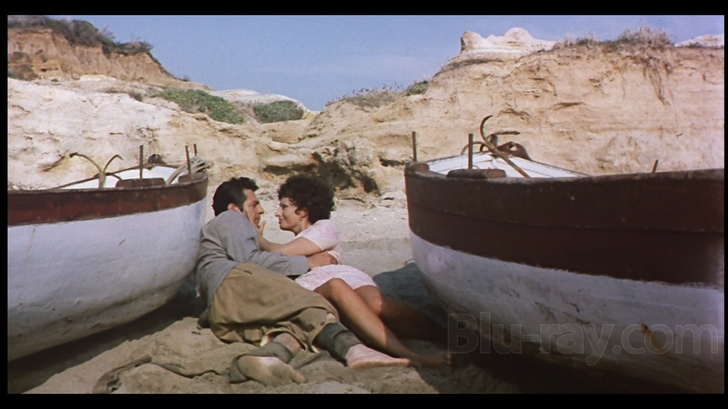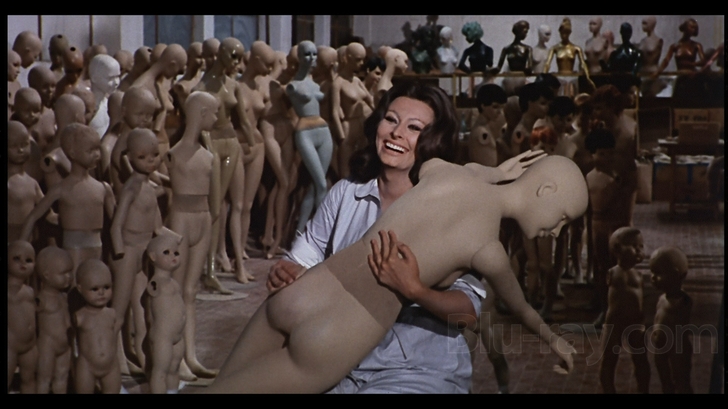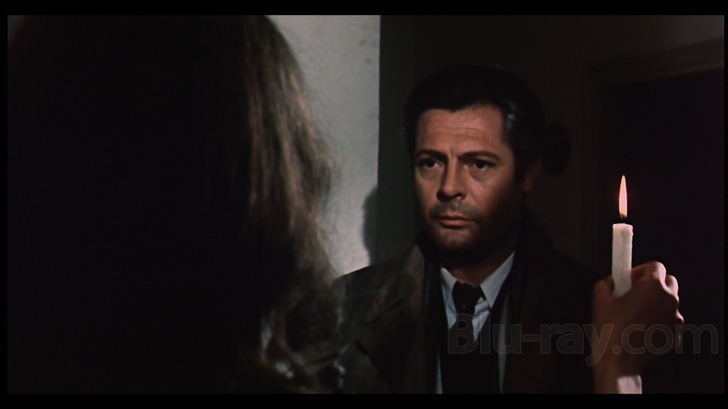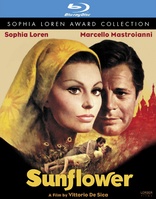Sunflower Blu-ray Movie
HomeSunflower Blu-ray Movie 
I girasoliKino Lorber | 1970 | 107 min | Not rated | May 17, 2011
Movie rating
7.2 | / 10 |
Blu-ray rating
| Users | 0.0 | |
| Reviewer | 3.5 | |
| Overall | 3.5 |
Overview
Sunflower (1970)
A desperate woman searches for her missing husband who never returned from the Russian front during World War II.
Starring: Sophia Loren, Marcello Mastroianni, Lyudmila Savelyeva, Anna Carena, Silvano TranquilliDirector: Vittorio De Sica
| Drama | 100% |
Specifications
Video
Video codec: MPEG-4 AVC
Video resolution: 1080p
Aspect ratio: 1.89:1
Original aspect ratio: 1.85:1
Audio
Italian: Dolby TrueHD 2.0
Subtitles
English
Discs
25GB Blu-ray Disc
Single disc (1 BD)
Playback
Region A, B (C untested)
Review
Rating summary
| Movie | 3.5 | |
| Video | 3.0 | |
| Audio | 3.5 | |
| Extras | 0.5 | |
| Overall | 3.5 |
Sunflower Blu-ray Movie Review
Loren and Mastroianni reenact another story of ill-fated love.
Reviewed by Casey Broadwater June 16, 2011Actor-turned-director Vittoria De Sica was a major figure in the Italian neorealist movement—a “cinema of the poor” that depicted the real-life issues of Italy’s underclass—and his films Shoeshine (1946), The Bicycle Thief (1948), and Umberto D. (1952) are now considered classics of the post-war canon. Although his later films never recaptured the documentary-like power and social scope of his earlier efforts, he made a number of fine romances and comedies as he got older, several of them starring the most memorable screen couple in Italian cinema: seemingly immortal sex-bomb Sophia Loren and Marcello Mastroianni, the handsome, versatile actor best known for his roles in Antonioni’s La notte, and Fellini’s La dolce vita and 8 1/2. Kino Video has recently released three latter-day De Sica/Loren/Mastroianni collaborations on Blu-ray, including Marriage Italian Style, Yesterday, Today and Tomorrow, and Sunflower. This last film has the distinction of being one of the first international movies allowed to be shot inside the U.S.S.R., and includes several scenes of daily life in turn-of-the-1970s Moscow. This makes Sunflower interesting from a historical perspective, but the film is certainly worthwhile on its own as an example of finely made melodrama.

Like Marriage Italian Style, this is another film where Sophia Loren starts off as a young, buxom beauty and then ages—gracefully—over the course of the story. In Sunflower, set during wartime, she plays Giovanna, a Milanese woman who falls in love with Antonio (Mastroianni), an electrician who’s been called up to serve on the Russian front. To forestall his deployment, the couple decides to get married, buying them an extra twelve days together. Their hope is that the war—by this point in its late stages—will end before their honeymoon is over. The early scenes are filled with the kind of romantic comedy Loren and Mastroianni perfected in Yesterday, Today and Tomorrow. At one point, when the two are making out on the beach, Antonio is so enraptured with nibbling at Giovanna’s neck that he swallows one of her pearl earrings and has to wash it down with seawater. One of the funniest moments in the film is when Antonio cooks for his new bride his culinary specialty—a 24-egg frittata omelet. The two sit down at the table to engage in some serious eating, and when De Sica cuts suddenly to after their marathon munching session, Antonio and Giovanna are both sweating and bloated, swearing to never eat another egg for as long as they live. Reality intervenes when Antonio receives his marching orders, and although he tries to feign insanity in order get thrown out of the army—another hilarious sequence—he inevitably joins thousands of other soldiers on a train to the front. When the soldiers return home after the war, Antonio isn’t among them.
Years later, after petitioning the government to no use—she’s told Antonio is missing and presumed dead—Giovanna, sensing instinctively that her husband is still alive, travels to Russia to search for him, following a hunch from one of Antonio’s infantry buddies. An official from the Ministry of Foreign Trade takes her to a former battleground where thousands of Italian soldiers are buried under a field of sunflowers—hence the title—but Giovanna, like many of Sophia Loren’s characters throughout her career, is steel-willed and undeterred. She eventually finds Antonio, of course— what kind of melodrama would this be if she didn’t?—but, without revealing too much, there’s an immense obstacle in the way of their reunion. Giovanna returns to Italy, crushed, angry, and overwhelmed, yet this isn’t quite the end for the two one-time lovers, who have been separated by fate and circumstance but still love each other. There’s not much of a plot here, but Sunflower is carried by its changing emotional moods and the intelligence with which it evokes the feeling of tragically impossible love. Near the end of the film, there are some wonderful conversations between Giovanna and Antonio, as they talk their way around a complicated, life-altering issue that has no easy answers beyond che sarà sarà.
As usual, the pairing of Loren and Matstroianni is perfect. She, of course, has always had the ability to be unselfconsciously passionate, and he was a great charmer—loveably rakish, you might say—so it’s no surprise that the film’s first act is funny and sexy. After the war, however, the tone changes rather drastically, downplaying the comedy in favor of straight-up, undiluted melodrama. Most of the criticisms about Sunflower tend to focus on how bleary-eyed and sentimental it is, and I don’t think anyone would contest that. Larger than life emotions do take hold in this story of fools rush in-style love and heartache, and some of the film’s unlikely turns stretch credulity. That said, while this certainly isn’t the best film that Loren, Mastroianni, and De Sica made together, it has its merits and it’s certainly worth revisiting, especially for Loren fans. The scenes shot in Soviet-era Russia set the film apart, giving it some cultural perspective and shedding light on the relatively unknown fact that thousands of Italian soldiers really did relocate in the U.S.S.R. after the WWII. In a limited capacity—a few flashbacks—De Sica also shows the hardships of the Russian front, the cold winter marches and impossibility of staying warm. In one scene, the director uses real black and white stock footage from the war, and on top of this he overlays an image of a fluttering red flag, recalling Battleship Potemkin. Finally, no discussion of Sunflower would be complete without mentioning Henry Mancini’s rich, romantic score, which definitely contributes to all the tear-letting and nose-blowing.
Sunflower Blu-ray Movie, Video Quality 

A transfer of an older film is only as good as its source print and the amount of work that's been put into restoring it. While Sunflower does indeed look better here than it's ever looked on home video, Kino's 1080p/AVC-encoded transfer leaves plenty of room for improvement. The picture is often dotted with black specks and small scratches, and it doesn't look like there's been much attempt to clean up minor debris. If you look closely at the right side of the screen, however, you will often notice a faintly perceptible vertical line that's present for most of the film. It looks like there was a scratch that ran through the duration of the print and Kino has scrubbed it out, leaving slight digital traces of their restoration work. As far as I'm concerned, this is vastly preferable to having a thick line running down the screen for the entire film, but it's worth noting. It also appears that some degree of DNR has been used to remove excess noisiness from the picture. Grain is still apparent, but it looks somewhat frozen at times, and textures are noticeably soft and spongy. How much of this softness is inherent in the source material is hard to say, but I suspect the picture doesn't look as natural and filmic as it could. Still, the upgrade to high definition is immediately apparent. Even if the image is never truly sharp, it looks tighter and more refined. Color seems suitable dense too, although blacks can be a bit hazy. Do note that the 1.85:1 image has been windowboxed, presumably to prevent overscan.
Sunflower Blu-ray Movie, Audio Quality 

Kino-Lorber has given Sunflower a true-to-source Dolby TrueHD mono track. Obviously, given the limitations of the recording process and low- budget sound design at the time, you shouldn't expect miracles from this mix, but for the most part, the film sounds wonderful. Henry Mancini's score is the real highlight here—it's a good one—and although the music sounds somewhat overdriven and harsh during the opening credits, it seems to improve throughout the film. A lot of the dialogue seems to have been recorded on location—rather than being dubbed later—so there's a good bit of acoustic ambience in the mix, especially when the couple is staying in their honeymoon cottage. Voices aren't as crisp and defined as what you'd expect from a more contemporary film, but they're never overly muffled or unintelligible. The disc includes optional English subtitles.
Sunflower Blu-ray Movie, Special Features and Extras 

- Trailers (1080p): Includes theatrical trailers for Marriage Italian Style (1:50), Yesterday, Today and Tomorrow (4:12), and Sunflower (3:59).
- Stills Gallery (1080p): A user-directed gallery with 15 behind-the-scenes stills and promo shots.
Sunflower Blu-ray Movie, Overall Score and Recommendation 

This isn't the best of the De Sica/Loren/Mastroianni collaborations, but if you're in the mood for a sweeping melodrama about impossible love—starring an iconic onscreen couple—Sunflower delivers all the tears and heartache you could ask for. Although Kino's high definition presentation isn't quite perfect, this is certainly the best the film has ever looked on home video. Recommended for any and all fans of Sophia Loren and/or Italian cinema.
Similar titles
Similar titles you might also like

Marriage Italian Style
Matrimonio all'italiana
1964

Yesterday, Today and Tomorrow
Ieri, oggi, domani
1963

Boccaccio '70
1962

The Front Line
고지전 / Go-ji-jeon
2011

Billion Dollar Brain
1967

The Marriage of Maria Braun
Die Ehe der Maria Braun
1978

Peppermint Candy
박하사탕 | 4K Restoration
1999

Like Someone in Love
ライク・サムワン・イン・ラブ / Raiku samuwan in rabu
2012

Umberto D.
1952

Beyond the Hills
După dealuri
2012

In the Fog
V tumane
2012

The Manchurian Candidate
1962

Stromboli
Stromboli, terra di Dio / English and Italian Versions
1950

The Last Command
1928

I Vitelloni
1953

Germany Year Zero
Germania anno zero
1948

The Tribe
Plemya
2014

Funeral in Berlin
1966

The Spy Who Came in from the Cold
1965

White Nights
1985
